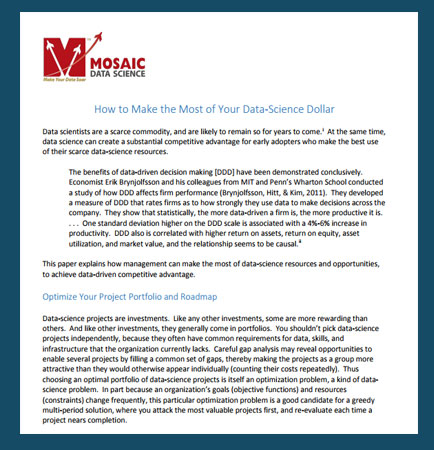
PROCESSING. PLEASE WAIT...


White Paper: Mosaic Data Science
Data scientists are a scarce commodity, and are likely to remain so for years to come. At the same time, data science can create a substantial competitive advantage for early adopters who make the best use of their scarce data-science resources.
data scientists often struggle to recognize that every data-science project is an optimization problem.iii In business the objective function is usually expected value, but sometimes expected value is and should be traded away to avoid the possibility of catastrophic losses.
Data science has a long, highly technical learning curve. An inexperienced team with limited background has two ways to shorten its learning curve. The first is training. For example, Coursera offers a series of online classes designed to train data scientists in specific computational techniques and tools.
This paper explains how management can make the most of data-science resources and opportunities, to achieve data-driven competitive advantage.

By: StarLeaf
Skype for Business is fast becoming the most widely-used single vendor unified communications platform. However, as the enterprise implements Skype for Business, it hits a seemingly impossible barrier, realizing complete video communication and collaboration. There is no easy or elegant way for existing video conferencing equipment to seamlessly integrate with Skype for Business. This whitepaper addresses what the available migration strategies for video calling and conferencing are, and how interoperability between Skype for Business and professional video systems can be achieved for inter and intra-company calls. It highlights: How to bridge the gap between Skype for Business and legacy H.323 meeting room systems on a scheduled meet-me basis ‘Do nothing’ strategy- Both the video conferencing rooms and Skype for Business are maintained in parallel How to achieve direct calling and conferencing for all, while maintaining current legacy room systems, registered directly to the video cloud
By: Software AG
Digital business transformation is based on an IT architecture transformation with a roadmap for digital capability implementation. Based on the software platforms, digital companies create enhanced or totally new business models which offer completely new digital customer experiences. Established companies are building up software know-how and are acquiring software companies to accelerate their digital transformation by injecting software innovation capabilities into their core business areas. This whitepaper helps to understand what makes today’s digital challengers attractive to customers and consumers, as it highlights their core competencies and differentiators based on their digital software-based technology. Key takeaways from this whitepaper: Digital challengers separate companies from their customers Implementing digital capabilities for digital use cases Digital companies have a micro services-oriented, scalable IT architecture


 2024 All Rights Reserved | by: www.ciowhitepapersreview.com
2024 All Rights Reserved | by: www.ciowhitepapersreview.com